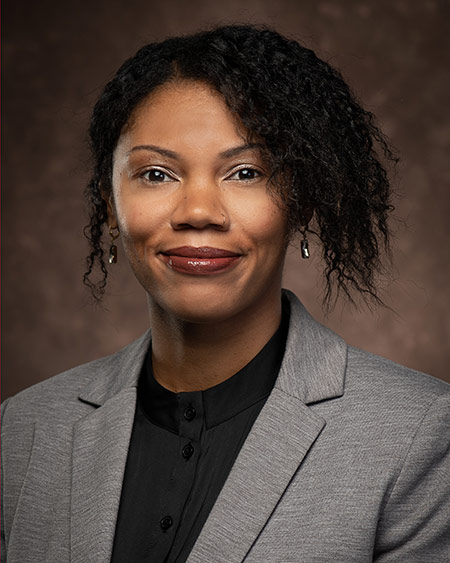Jacksonville State University Receives $2.4 Million HRSA Grant to Build Trauma-Informed Rural Mental Health Workforce
06/27/2025
Jacksonville, AL — Jacksonville State University’s Department of Social Work has received a $2.4 million grant from the Health Resources and Services Administration (HRSA) to launch a new Rural Trauma-Informed Behavioral Health Workforce Education and Training Program. The initiative will help address Alabama’s mental health workforce shortage by preparing MSW students to serve in high-need rural communities.
Co-led by Dr. Dominique Maywald, C-DBT, ERYT-200, DSW, LICSW-S, LCSW-CSW, and Tekeisha Goggins, MS, LICSW, PIP, this effort reflects a department-wide commitment to cooperation and innovation. Several members of Jax State’s Social Work Department contributed to the development of this proposal, reflecting the program’s deeply collaborative and mission-driven nature.
 Dr. Dominique Maywald |
 Tekeisha Goggins |
“From the very beginning, our mission in launching this program was clear, to help build a stronger behavioral health workforce in Alabama’s rural communities,” said Dr. Maureen Newton, Dean of the College of Social and Behavioral Sciences. “This has been our passion and focus from day one, and we’re thrilled to now have the opportunity to expand that vision through this grant.”
The project will provide scholarships and stipends to 48 Master of Social Work (MSW) students over four years, supporting their specialized training and field placement in high-need rural communities. The program is designed to build a robust, trauma-informed behavioral health workforce equipped to serve Alabama’s most underserved populations.
“I’m incredibly proud of the dedication our faculty showed in securing this grant,” said Dr. Kimber Wickersham, Department Head and Associate Professor of Social Work. “Our goal is to break down barriers for students who want to become licensed trauma-informed mental health practitioners in the communities they call home. We also hope this serves as a reminder to our students and alumni that if you have a dream to help others, even if it feels too big, pursue it anyway.”
Alabama faces one of the most severe behavioral health workforce shortages in the country, especially in rural communities, where access to timely, specialized care is often limited. Compounding this crisis are high poverty rates, a lack of trauma-informed services, and significant barriers to accessing care.
“This initiative is about building a system rooted in cultural humility, professional resilience, and community collaboration,” said Dr. Maywald. “We’re investing in students and in the future of Alabama’s rural behavioral health infrastructure.”
The development of the grant proposal was a collaborative effort across campus. Kim Westbrooks, a librarian formerly assigned to the Department of Social Work, played a key role in the early stages by helping gather essential demographic and workforce data.
The initiative includes three core components:
Scholarship & Stipend Program
Provides up to $25,000 in financial support per student, eliminating economic barriers for MSW trainees. Students also participate in trauma-informed coursework, experiential learning, and a specialized rural consultation group during their field placement year. Students will have their graduate tuition covered and receive a significant stipend during their internship practicum.
Center for Best Practices in Rural Behavioral Health
A new regional hub for training, continuing education, trauma-informed certification, and supervision. The Center will train over 1,600 behavioral health professionals during the grant period, offering social work supervision, clinical and non-clinical certifications, telehealth training, and professional development opportunities.
Rural Behavioral Health Collaborative
The Collaborative will develop a Rural Trauma-Informed Toolkit, host networking events, and offer mentorship and licensure exam preparation for current and future providers. An interdisciplinary coalition of health providers, educators, and community leaders working to create a replicable trauma-informed care model for rural areas.
The program also addresses widespread systemic challenges such as provider burnout and workforce instability, which are especially pronounced in rural behavioral health settings. Through resilience training, peer support, and trauma-informed organizational practices, Jax State’s initiative aims to strengthen provider well-being and improve long-term retention—particularly among those serving children, adolescents, and emerging adults.
“Our students are already working in the field, balancing full-time jobs, family responsibilities, and unpaid internships,” said Goggins. “This funding allows them to fully engage with their training and stay committed to this critical work.”
With a network of more than 140 behavioral health partners across 26 Alabama counties and 10 counties in Georgia, the program is uniquely positioned to address regional disparities in access to care and create long-term impact across the Southeast.
For more information about the program or to explore partnership opportunities, visit the Department of Social Work at Jacksonville State University online.

